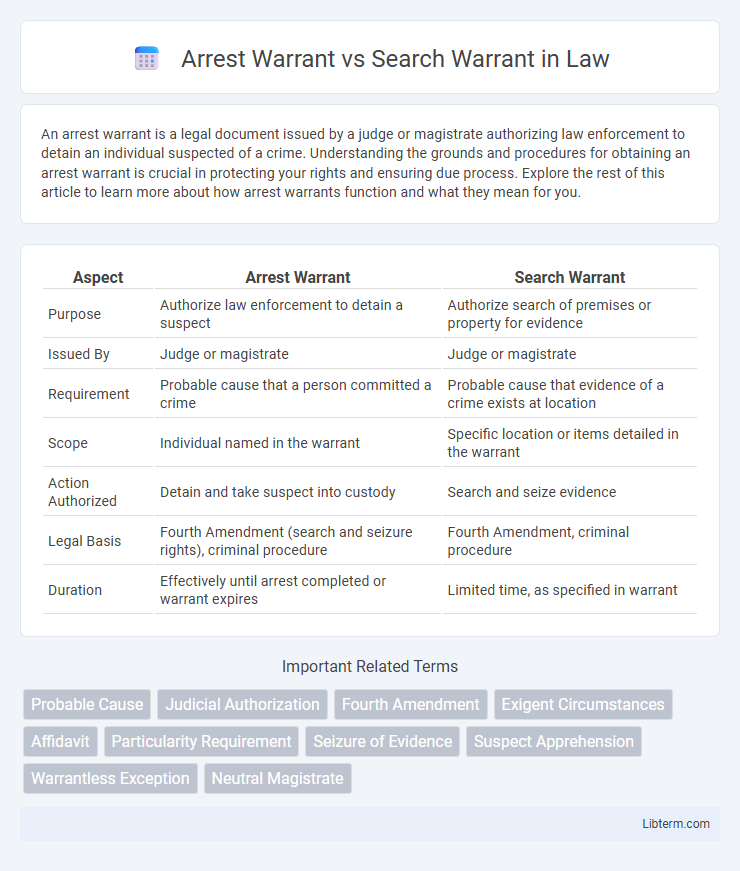An arrest warrant is a legal document issued by a judge or magistrate authorizing law enforcement to detain an individual suspected of a crime. Understanding the grounds and procedures for obtaining an arrest warrant is crucial in protecting your rights and ensuring due process. Explore the rest of this article to learn more about how arrest warrants function and what they mean for you.
Table of Comparison
| Aspect | Arrest Warrant | Search Warrant |
|---|---|---|
| Purpose | Authorize law enforcement to detain a suspect | Authorize search of premises or property for evidence |
| Issued By | Judge or magistrate | Judge or magistrate |
| Requirement | Probable cause that a person committed a crime | Probable cause that evidence of a crime exists at location |
| Scope | Individual named in the warrant | Specific location or items detailed in the warrant |
| Action Authorized | Detain and take suspect into custody | Search and seize evidence |
| Legal Basis | Fourth Amendment (search and seizure rights), criminal procedure | Fourth Amendment, criminal procedure |
| Duration | Effectively until arrest completed or warrant expires | Limited time, as specified in warrant |
Understanding Arrest Warrants
An arrest warrant is a legal document issued by a judge or magistrate authorizing law enforcement to detain a specific individual suspected of a crime. It must be based on probable cause, supported by sworn affidavits or evidence presented by law enforcement. Unlike search warrants, arrest warrants focus solely on the lawful apprehension of a person, not the search of property.
Defining Search Warrants
A search warrant is a legal document issued by a judge or magistrate authorizing law enforcement officers to search a specific location for evidence related to a crime. It must specify the exact place to be searched and the items sought, ensuring protection under the Fourth Amendment against unreasonable searches. Search warrants are based on probable cause, supported by sworn affidavits demonstrating sufficient evidence to justify the search.
Key Differences Between Arrest and Search Warrants
An arrest warrant authorizes law enforcement to detain a specific individual based on probable cause that they have committed a crime, while a search warrant permits the search of a particular location for evidence related to a crime. Arrest warrants require clear identification of the suspect, whereas search warrants must specify the areas and items to be searched or seized. Both types of warrants are issued by a judge or magistrate and are essential tools under the Fourth Amendment to prevent unreasonable searches and seizures.
Legal Requirements for Issuing Arrest Warrants
Arrest warrants require probable cause supported by oath or affirmation, demonstrating that a specific individual has committed a crime, as mandated by the Fourth Amendment. Judges or magistrates must evaluate factual evidence presented by law enforcement before issuing an arrest warrant, ensuring the protection of individual rights against unreasonable seizures. Unlike search warrants that pertain to property, arrest warrants specifically authorize the detention of a person and must clearly identify the suspect by name or description.
Legal Criteria for Obtaining Search Warrants
Legal criteria for obtaining search warrants require probable cause supported by oath or affirmation, detailing specific locations or items to be searched and seized. Judges or magistrates must evaluate evidence presented by law enforcement to ensure the warrant is justified and narrowly tailored to prevent unreasonable searches. Unlike arrest warrants, which focus on evidence linking a person to a crime, search warrants emphasize the necessity of searching particular premises or objects connected to criminal activity.
Authorities Empowered to Issue Warrants
Arrest warrants are issued by judges or magistrates based on probable cause that a specific individual has committed a crime, empowering law enforcement to take the person into custody. Search warrants are also authorized by judges or magistrates after establishing probable cause that evidence related to a crime can be found at a particular location, allowing officers to conduct a search. Both types of warrants ensure judicial oversight, but they serve distinct legal functions with specific procedural requirements under criminal law.
Rights of Individuals During Arrests
Arrest warrants authorize law enforcement to detain a specific individual based on probable cause, ensuring the individual's right to be informed of the charges and to remain silent under the Fifth Amendment. Search warrants permit police to enter and search a defined location but do not justify arrest unless coupled with probable cause for detention. Both warrants require adherence to constitutional protections, including the Fourth Amendment's safeguard against unreasonable seizures and the right to legal counsel during arrest procedures.
Limits of a Search Warrant
A search warrant strictly limits law enforcement to specified locations and items described in the warrant, ensuring protection against unreasonable searches under the Fourth Amendment. It requires probable cause and judicial approval, detailing the scope, duration, and methods for evidence collection. Exceeding these limits can render collected evidence inadmissible in court due to violations of constitutional rights.
Consequences of Invalid Warrants
Invalid arrest warrants can lead to unlawful detentions, violating constitutional rights and potentially resulting in civil liability for law enforcement agencies. Search warrants found to be invalid may cause evidence obtained to be suppressed in court, undermining criminal prosecutions and leading to case dismissals. Both types of invalid warrants erode public trust in the justice system and compromise the integrity of legal proceedings.
Frequently Asked Questions: Arrest vs Search Warrants
An arrest warrant authorizes law enforcement to detain a specific individual suspected of a crime, while a search warrant permits the police to search a particular location for evidence. Arrest warrants require probable cause that the individual committed a crime, and search warrants demand probable cause that evidence related to the crime exists at the location. Both warrants must be issued by a judge or magistrate based on verified facts to ensure legal compliance and protect constitutional rights.
Arrest Warrant Infographic

 libterm.com
libterm.com